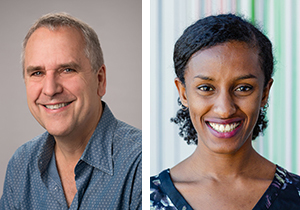5 questions for Michael Jordan and Rediet Abebe

CS Prof. Michael Jordan and Assistant Prof. Rediet Abebe are featured in the Center for Data Innovation’s “5 Questions” series, in which data innovators discuss their research focus areas and careers. Jordan, whose research spans computational, statistical, cognitive, and social sciences, discusses how economic concepts can help advance AI as well as the challenges and opportunities of coordinating decision-making in machine learning. Abebe, who will begin teaching in the spring, is the co-founder of Mechanism Design for Social Good (MD4SG), an initiative that uses techniques from algorithms, optimization, and mechanism design (a field in economics that studies the mechanisms through which a particular outcome or result can be achieved), along with insights from other disciplines, to improve access to opportunity for historically underserved and disadvantaged communities.